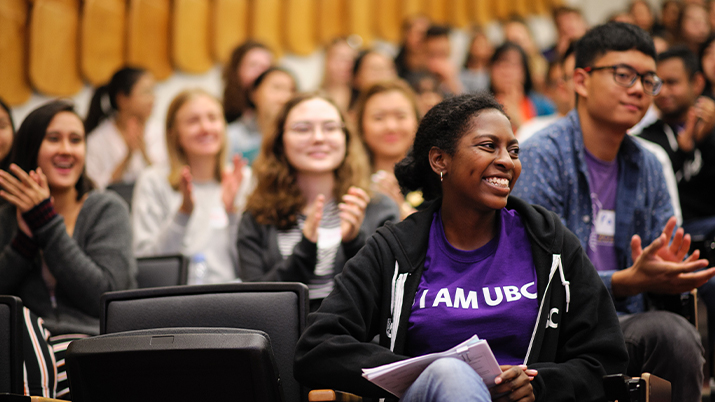From energy use to intellectual property, generative large language models (one of the things we commonly call AI), poses unique ethical questions: what constitutes fair use? Responsible computing? Intellectual rigor? Consent? Join UBC’s School of Creative Writing for a panel featuring Vauhini Vara, Michele Elam, and Lillian-Yvonne Bertram to discuss the use of artificial intelligence as a tool in creative work and how each artist navigates their own ethical qualms and queries.
Registration is open to everyone for this online event.
Moderated by A.E. Osworth
We’re excited to host several visiting writer events for our students, alumni and faculty this term. To help celebrate, the UBC Bookstore is offering a 20% discount on featured books in-store and online from October 13 to October 27. Visit the bookstore for more information.
Access
The School of Creative Writing is committed to making our events as accessible as possible. If you have questions or requests about access, please contact Sarah Leavitt at least one week before the event at sarah.leavitt@ubc.ca.
About the Speakers
Lillian-Yvonne Bertram is an African American writer, poet, artist, and educator who works at the intersection of computation, AI, race, and gender. They are the author of Travesty Generator (Noemi Press), a book of computational poetry that received the Poetry Society of America’s 2020 Anna Rabinowitz prize for interdisciplinary work and longlisted for the 2020 National Book Award for Poetry. They are the recipient of a National Endowment for the Arts Poetry Fellowship. Their other poetry books include How Narrow My Escapes (DIAGRAM/New Michigan), Personal Science (Tupelo Press), a slice from the cake made of air(Red Hen Press), and But a Storm is Blowing From Paradise (Red Hen Press). Their most recent full length poetry book, Negative Money, was published in 2023. Their new chapbook, written with AI, is called A Black Story May Contain Sensitive Content and won the 2023 Diagram/New Michigan chapbook contest. They direct the MFA in creative writing program at the University of Maryland and are a 2024 Foundation for Contemporary Arts poetry grant recipient and 2024 Ruby’s Grant recipient
Michele Elam is the William Robertson Coe Professor of Humanities in the English Department at Stanford University, Former Associate Director and currently a Senior Fellow at theInstitute for Human-Centered Artificial Intelligence and a Race & Technology Affiliate at the Center for Comparative Studies in Race and Ethnicity . Former Director of African & African American Studies, Elam is also affiliated with the Clayman Institute for Gender Research and with the Wu Tsai Neuroscience Institute.
Elam’s research in interdisciplinary humanities connects literature, social sciences, and STEM in order to examine changing cultural interpretations of gender and race. Her work is informed by the understanding that racial perception and identification in particular impacts outcomes for health, wealth and social justice. More recently, her scholarship examines intersections of race, technology and the arts. “Race Making in the Age of AI,” her most recent book project, considers how the humanities and arts function as key crucibles through which to frame and address urgent social questions about equity and social justice in socially transformative technologies. Her undergraduate interdisciplinary courses, “AI + Arts,” and “Black Mirror: AI Activism” represent efforts to introduce these issues early in students’ careers at Stanford.
Vauhini Vara is the author of This is Salvaged, which was longlisted for the Story Prize and the Mark Twain American Voice in Literature Award and named a notable book of 2023 by Publisher’s Weekly, The New Yorker and others, and The Immortal King Rao, which was a finalist for the Pulitzer Prize, was shortlisted for the National Book Critics Circle’s John Leonard Prize and the Dayton Literary Peace Prize, and was the winner of the Colorado Book Award.
Her third book, a work of nonfiction called Searches, will be published in 2025. That collection includes the essay “Ghosts,” which was anthologized in The Best American Essays 2022; Vara has adapted “Ghosts” into a play, “Ghost Variations,” selected for the Denver Center for the Performing Arts’s Colorado New Play Summit in 2024. Vara is also a journalist, currently working as a contributing writer for Businessweek, and an editor, most recently at The New York Times Magazine.
Vara’s fiction has been honored by the Canada Council for the Arts, the the Rona Jaffe Foundation, Yaddo and MacDowell. Her journalism has won honors from the Asian American Journalists Association, the South Asian Journalists Association, the International Center for Journalists, and the McGraw Center for Business Journalism.
She teaches at the Lighthouse Writers Workshop’s Book Project. She is also the secretary of Periplus, a mentorship collective serving writers of color.


